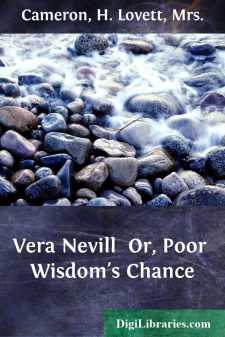Categories
- Antiques & Collectibles 13
- Architecture 36
- Art 48
- Bibles 22
- Biography & Autobiography 813
- Body, Mind & Spirit 142
- Business & Economics 28
- Children's Books 17
- Children's Fiction 14
- Computers 4
- Cooking 94
- Crafts & Hobbies 4
- Drama 346
- Education 46
- Family & Relationships 57
- Fiction 11829
- Games 19
- Gardening 17
- Health & Fitness 34
- History 1377
- House & Home 1
- Humor 147
- Juvenile Fiction 1873
- Juvenile Nonfiction 202
- Language Arts & Disciplines 88
- Law 16
- Literary Collections 686
- Literary Criticism 179
- Mathematics 13
- Medical 41
- Music 40
- Nature 179
- Non-Classifiable 1768
- Performing Arts 7
- Periodicals 1453
- Philosophy 64
- Photography 2
- Poetry 896
- Political Science 203
- Psychology 42
- Reference 154
- Religion 513
- Science 126
- Self-Help 84
- Social Science 81
- Sports & Recreation 34
- Study Aids 3
- Technology & Engineering 59
- Transportation 23
- Travel 463
- True Crime 29
Vera Nevill Or, Poor Wisdom's Chance
Categories:
Description:
Excerpt
THE VICAR'S FAMILY.
With that regal indolent air she hadSo confident of her charm.
Owen Meredith.
Beauty too rich for use, for earth too dear.
Shakespeare.
Amongst the divers domestic complications into which short-sighted man is prone to fall there is none which has been more conclusively proved to be an utter and egregious failure than that family arrangement which, for lack of a better name, I will call a "composite household."
No one could have spoken upon this subject with greater warmth of feeling, nor out of the depths of a more painful experience, than could the Rev. Eustace Daintree, sometime vicar of the parish of Sutton-in-the-Wold.
Mr. Daintree's family circle consisted of himself, his mother, his wife, and his wife's sister, and I should like to know how a man could expect to lead a life of peace and tranquillity with such a combination of inharmonious feminine elements!
There were two children also, who were a fruitful source of discord and disunion. It is certain that, had he chosen to do so, the Rev. Eustace might have made many heart-rending and harrowing revelations concerning the private life and customs of the inhabitants of his vicarage. It is equally certain, however, that he would not have chosen to do so, for he was emphatically a man of peace and gentleness, kind hearted and given to good works; and was, moreover, sincerely anxious to do his duty impartially to those whom Providence or fate, or a combination of chances and changes, had somehow contrived to bring together under his roof.
Things had not always been thus with him. In the early days of their married life Eustace Daintree and Marion his wife had had their home to themselves, and right well had they enjoyed it. A fairly good living backed up by independent means, a small rural parish, a pleasant neighbourhood, a pretty and comfortable vicarage-house—what more can the hearts of a clergyman of the Church of England and his wife desire? Mr. and Mrs. Daintree, at all events, had wished for nothing better. But this blissful state of things was not destined to last; it was, perhaps, hardly to be expected that it should, seeing that man is born to trouble, and that happiness is known to be as fleeting as time or beauty or any other good thing.
When Eustace Daintree had been married five years, his father died, and his mother, accepting his warmly tendered invitation to come to Sutton-in-the-Wold upon a long visit, took up her abode in the pleasant vicarage-house.
Her visit was long indeed. In a weak moment her son consented to her urgent request to be allowed to subscribe her quota to the household expenses—this was as good as giving her a ninety-nine years' lease of her quarters. The thin end of the wedge thus inserted, Mrs. Daintree mère became immovable as the church tower or the kitchen chimney, and the doomed members of the family began to understand that nothing short of death itself was likely to terminate the old lady's residence amongst them. For the future her son's house became her home....


